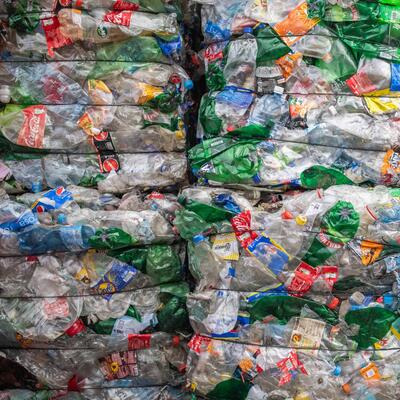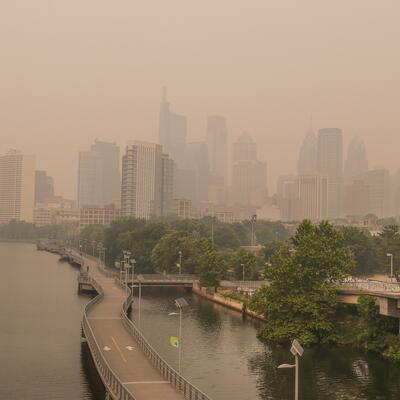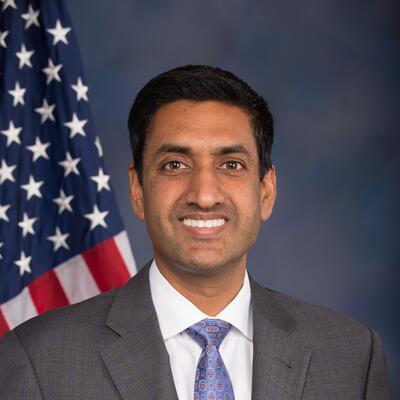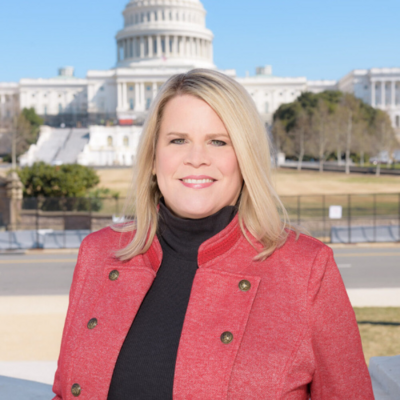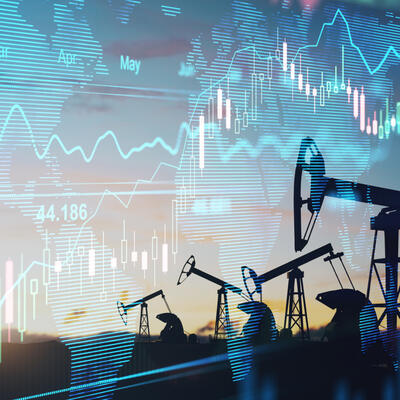
Disrupted Energy Markets: Fossil Revival or Renewable Opportunity?
Guests
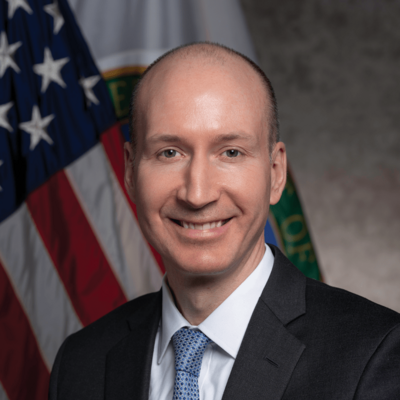
David M. Turk

Kate Larsen

Justin Guay
Summary
As Russia’s invasion of Ukraine and surging inflation disrupt global energy markets, even insiders are scrambling to make sense of this moment. The European Union recently agreed to ban imports of 90 percent of Russian crude oil by the end of the year. This move has already sent oil prices soaring. Kate Larsen, partner at the Rhodium Group, says, “An important piece of Europe's journey toward decarbonization, which they have committed to fully, is understanding in the short term how to meet the needs of the public and keep industry running for the next year with the real risk of supplies being cut off in particular gas supplies. But then also looking into the long-term of what Europe needs to do to wean itself off of oil and gas supplies writ large but in particular from problematic autocratic states like Russia.”
Meanwhile, the Biden administration has signaled it wants more oil and gas now to ease pain at the pump ahead of the upcoming midterm elections, while also maintaining its support of cutting carbon emissions. Justin Guay, Director of Global Climate Strategy at the Sunrise Group, observes, “There is, on any given day of the week, an administration official loudly arguing for more oil and gas, and any other day of the week, an administration official pondering openly whether or not clean energy is actually the true path to peace, security and freedom.”
David Turk, Deputy Secretary of the US Department of Energy, says the Biden administration is dealing with three interrelated crises at the heart of the global energy market disruption: climate, COVID, and the Russian invasion of Ukraine. These crises have not only made oil and gas prices soar, but have also disrupted the clean energy market. “The energy markets have been in turmoil over the last couple of years and we’re seeing now a lot of supply-chain challenges, including for key, key clean energy technologies whether in the US or in the world as well.”
While many in the climate community know that certain measures need to be taken to buffer the ripple effects of the war in Ukraine, Justin Guay worries that the fossil fuel industry will take advantage of the circumstances, “The thing that we are deeply worried about is the oil and gas industry’s cynical opportunism and attempt to secure approval of a wave of new infrastructure which is not actually destined to support Europe in its time of crisis but is really meant to speed its approval to entrench our reliance on fossil fuels, which is of course not energy security, it’s energy insanity.”
Turk believes it’s time for clean energy to take center stage. “Clean energy is ready for prime time. And we’re seeing that already it doesn't mean that we can take the accelerator off in fact, it's the exact opposite, right. We should be leaning in, doubling down, tripling down. We’ve realigned our whole Department of Energy accordingly to try to use the $62 billion that we’ve been given as part of the bipartisan infrastructure legislation to really accelerate the clean energy transition in our country.”
Kate Larsen thinks that the current disruptions in the market present a significant opportunity for acceleration of the clean energy transition. “The economics are really great now for electric vehicles, wind, solar but at the scale that we need. So, not just to begin to phase out the brown energy that we already have but to build significantly more clean electricity to electrify all of the things that are currently running on oil or gas.”
Related Links:
US Policy Options to Reduce Russian Energy Dependence
Full Transcript
Greg Dalton: This is Climate One. I’m Greg Dalton. The energy industry is used to wild cycles of boom and bust. But even for veterans, today’s markets are gut-wrenching.
Kate Larsen: Europe is looking to phase out both Russian oil and gas, both critical to current European industry heating homes and businesses and generating electricity.
Greg Dalton: The Russian invasion of Ukraine has forced Europe to rethink how it handles its own energy needs.
David Turk: We’re seeing now a lot of supply-chain challenges, including for key clean energy technologies.
Greg Dalton: How is all the energy market chaos impacting US climate goals?
Justin Guay: There is, any given day of the week, an administration official loudly arguing for more oil and gas, and any other day of the week, an administration official pondering openly whether or not clean energy is actually the true path to peace, security and freedom.
Greg Dalton: Disrupted Energy Markets. Up next on Climate One.
Greg Dalton: This is Climate One. I’m Greg Dalton. As Russia’s invasion of Ukraine and surging inflation disrupt global energy markets, even insiders are scrambling to make sense of this moment. In one major move the European Union has agreed to ban imports of 90 percent of Russian crude oil by the end of the year. That will increase demand from other suppliers and send oil prices soaring. Meanwhile, the Biden administration has signaled it wants more oil and gas extracted now to ease pain at the pump ahead of the upcoming midterm elections. At the same time, it also says it remains committed to eventually replacing oil and gas with cleaner energy to cut carbon emissions. On the show today we are going to sort out this messy and perplexing puzzle of switching fuels while keeping the economy humming. David Turk is Deputy Secretary for the U.S. Department of Energy. Kate Larsen is a Partner at the Rhodium Group—an independent research firm—where she leads work on international energy and climate change. And Justin Guay is the Director for Global Climate Strategy at the Sunrise Project. As Europe moves away from dependence on Russian oil, I asked Kate Larsen how that would affect the oil market globally and in the United States.
Kate Larsen: Europe is looking to phase out both Russian oil and gas both critical to current European industry heating homes and businesses and generating electricity. And so, really an important piece of Europe's journey toward decarbonization which they have committed to fully is understanding in the short term how to meet the needs of the public and keep industry running for the next year with the real risk of supplies being cut off in particular gas supplies. But then also looking into the long-term of what Europe needs to do to wean itself off of oil and gas supplies writ large but in particular from problematic autocratic states like Russia. The US is facing the same challenges it’s a global market for oil we’re seeing oil prices rise, even though we are producing significant almost all of our own domestic supply. Those global prices really impact us at home. So, there's a lot that we can do and that we are doing in the US and in Europe. A lot of that is to really quickly reduce our demand for those fuels as quickly as possible to weather the short-term crisis but also to build the future that we need. And that means rapidly scaling up electric vehicles both passenger and heavy-duty vehicles. Finding alternative fuels clean fuels and biofuels and electrofuels that can replace oil in our vehicles. But also looking for replacements for gas and industry in particular, looking at renewable hydrogen. The US is really well-positioned to be a supplier of the next wave of all of those clean fuels and energy and this is the moment that we need to seize using our legislative authority and our regulatory authority to make sure that the US is the source of these clean fuels and technologies for Europe and others so that we’re not at the dependency of autocratic states who are using the profits from those fuels to invade Ukraine currently.
Greg Dalton: Right. And Putin has taken in a lot more through fossil fuel sales than he did a year ago because those prices are up. Dave Turk, the Biden administration has signaled that wants more oil and gas now to ease the pain at the pump ahead of the upcoming midterm elections. What’s the administration trying to do to meet this moment in energy and climate, balancing the immediate needs in the long-term climate imperative?
David Turk: I think one thing we need to appreciate is there are really three different interrelated crises I think we’re trying to deal with. And we’re trying to deal with this certainly from the Biden administration part working with key allies in Europe and others around the world. One is the climate crisis. And of course, the climate crisis has been with us unfortunately for years. We've not done what we should have done as much the volume the scale the pace five years ago, 10 years ago, 15 years ago let alone over the last couple year period of time. The IPCC analysis all that we see is just underscoring just an even greater sense of urgency to get our acts together not just with targets that are out there 30 years into the future but the real-world action now so that we can actually do the kinds of things that we need to on that front. So, we’ve got that crisis. COVID-19 has really thrown energy more broadly out of whack in all sorts of different ways. The energy markets have been in turmoil over the last couple of years and we’re seeing now a lot of supply-chain challenges, including for key, key clean energy technologies whether in the US or in the world as well. And then you put on top of that the third crisis of Putin and Ukraine and complete naked aggression from Putin to the Ukrainians and that has thrown not just in Europe but because a lot of energy markets of course are interrelated in one way or another whether truly global like oil or natural gas which is semi-global commodity at this point out of whack as well and thrown supply-chains even more out of whack as well. So, we’re trying to focus on the near term but the long term and trying to focus on affordability, reliability and climate change and sustainability all at once. And it’s not easy to say the least, these three crises are incredibly challenging to navigate.
Greg Dalton: Indeed. So, Justin Guay, you know, COVID, climate, Ukraine. Throw in there an administration that has razor thin control of two branches of government. How do you think the Biden administration is doing to address this energy situation and climate right now?
Justin Guay: Well, look, I think the first and most important thing to say is that these are obviously difficult times. And so, we don't as the climate community begrudge the Biden administration having to make difficult choices. But I think the challenge that we see when you sit in our seat is that it's a bit difficult to tell exactly the direction we’re headed. So, there is any given day of the week an administration official loudly arguing for more oil and gas and any other day of the week, an administration official pondering openly whether or not clean energy is actually the true path to peace, security and freedom. And obviously one of those two messages is the one that appeals to my heart to many in the climate communities. But I think it's a reflection of a somewhat schizophrenic approach we see right now. But I think it's important to separate the nuance here, which is that even in the climate community no one begrudges the notion that there is an immediate crisis moment in Europe and that there is an immediate need for support or diversification or redirection of existing fossil fuel supplies to avoid the economic pain and the fallout from the invasion of the Ukraine. So, that I don't think is particularly controversial even in the climate community. The thing that we are deeply worried about is the oil and gas industry’s cynical opportunism and attempt to secure approval of a wave of new infrastructure which is not actually destined to support Europe in its time of crisis but is really meant to speed its approval to entrench our reliance on fossil fuels, which is of course not energy security; it’s energy insanity. And I don’t think from where I sit that that was what the Biden administration is trying to do that is clearly not the direction of travel of President-elect Biden or a sitting President Biden and his administration. But it's very difficult when we hear different messages just about every other day. And so, I think the conversation we want to be seeing and having is the one that is reflected by the EU’s formal plan to get off gas as Kate said, the repower EU plan. That plan is very clear in its goals. By the end of this year if not next they were going to reduce their reliance on Russian gas by two thirds, not by increasing their overall gas reliance and gas burn, but by diversifying their supplies and reducing their overall consumption. And by 2030 they’re going to reduce gas consumption by 30%. So, the biggest signal being sent to global markets today is that Europe is going to rely less on gas going forward. There is not a booming new growth market in Europe for US shale producers to capture. There is a disappearing, vanishing market in Europe and a clean energy boom. And so, the conversation we would love to be having is one around the Clean Marshall Plan. What are the investment resources? What is the investment needs to help unlock solar wind, long-duration storage green hydrogen at scale today? Because unlike the last big supply shock that we all lived, well, I didn’t live through it, but many people did live through in the 70s. This time clean energy is ready for prime time, you know. Our stuff is cheaper, faster to deploy; it is ready to provide ultimate security which is something that more fossil fuels simply can’t do. And I think from where I sit, I do believe that is the long-term goal of the Biden administration, but I do think we need a bit more clarity in the moment because as I said we’re seeing an awful lot of noise generated by the oil and gas industry which is meant to serve as political cover for a bunch of assets that are stranded at best and at worst cynical opportunities to lock the rest of the world, namely Asia into our supplies for the long haul.
Greg Dalton: And of course, Europe has a bit of an advantage; they don't have quite the fossil fuel extraction in Europe as the US has; it's not quite the same kind of incumbent industry defending its turf there. But Dave Turk, your response to that that the administration is not being focused and clear and ambitious.
David Turk: Well, I have to say I agree with Justin on a lot of what he said and appreciate these are not easy circumstances. There are challenges here that we’re trying to work through specially to try to figure out how we help Europe in this time of need. And the rest of the world as well and send a clear message, right. We had naked aggression going, a bigger state invading another state in the 21st century in 2022. Quite remarkable I think a lot of people were skeptical it was going to happen, but it did happen and democracy is on the line, human rights are on the line, self-determination is on the line. All those kinds of things that we need to really be thoughtful and push back on as aggressively as we possibly can. Completely agree with Justin: clean energy is ready for prime time. And we’re seeing that already it doesn't mean that we can take the accelerator off in fact, it's the exact opposite, right. We should be leaning in, doubling down, tripling down. We’ve realigned our whole Department of Energy accordingly to try to use the $62 billion that we’ve been given as part of the bipartisan infrastructure legislation to really accelerate the clean energy transition in our country. Whether you're talking all sorts of renewables whether you're talking clean green hydrogen as Kate was mentioning or geothermal, our grids, you name it we’re trying to lean on that piece. There is still some unfinished piece of business on Capitol Hill that we’re working with key senators on getting some of those tax incentives and some other pieces is incredibly, incredibly valuable. And I think we not only need to work with our European colleagues on a Clean Marshall Plan as Justin said for Europe but that’s the way we should be thinking about it here in the US. That’s the way Japan should be thinking about it. I made the argument many times if we had more clean green hydrogen in the system right now if we had more offshore wind in the system right now if we had more EVs in the system right now if we had more, you name it, in terms of clean energy technology we’d be in a much, much better place certainly from the carbon footprint. But we’d be in a much, much better place from an energy security side of things from resilient side of things. And so, now's the time to push the accelerator down even further not to slow up on that front. And we hope there's an opportunity to work with key senators. There's a hope we’re working with key ministers around the world ministries around the world to really do that.
Greg Dalton: Kate, we have a tendency to want this transition from fossil fuels to clean to be orderly and predictable. Tom Friedman, in The New York Times wrote an article recently slamming oil companies for pursuing business. They know it’s incompatible with the livable economy. He also slams the greens for “There is no immaculate pathway from brown energy to green energy. The road is paved with cruel trade-offs. Pick your poison - but grow up." Have clean energy advocates oversimplify the transition from fossil to clean saying it would be happy and orderly?
Kate Larsen: I mean I think we all wish it would be that way. And there was a world where it could have been that way if everyone had gotten on board for that when they should have, right? A decade ago we saw the writing on the wall and both government and industry failed to set up the conditions for the future that we know we needed. Now, we are in not even the second-best situation where we need to do everything yesterday. And I think the challenge with that is one, you know, I think there's a really clearly articulated vision and a lot of great work that's been done by the environmental community in particular to help phase out coal. And a strong vision about what we don't want and I think a good strong vision about what we need and the end goal of what we need which is massive, massive deployment of renewables of electric vehicles of clean hydrogen. But to get there we need more than what we don't want, right. And so, like this vision needs to include much more detail about how we get there and I think we've been really focused on sort of the regulatory pathways of requiring cleaner fuels technologies to phase in over time. And the economics are really great now for electric vehicles, wind, solar but at the scale that we need. So, not just to begin to phase out the brown energy that we already have but to build significantly more clean electricity to electrify all of the things that are currently running on oil or gas. We need a massive buildout of electricity infrastructure. And a lot of that's being bogged down by permitting and siting in communities across the US where there is no constituency advocating for really hard choices like putting a wind farm in communities in the Midwest that are actively advocating against it. And when you don't have the same kind of advocacy in favor of these choices and I think this requires a lot of hard work in bringing communities together and community engagement and making sure that it's done in a fair, just, equitable way, that's really where the rubber hits the road. And I think that's an area where again better collaboration and focus on the details of this massive scale up. And we’re gonna need industries to produce these products in infrastructure and they need to be clean as well. And so, understanding that I think both the environmental community industry and government working together to really be clear eyed about the requirements for building this new energy infrastructure and getting real about that. Not just we need 100% renewable future it’s how do we get there. And I think that’s where we could come together for more focus.
Greg Dalton: You’re listening to a Climate One conversation about the disrupted global energy market. Our podcasts typically contain extra content beyond what’s heard on the radio. If you missed a previous episode, or want to hear more of Climate One’s empowering conversations, subscribe to our podcast wherever you get your pods. Coming up, how does solar power factor into the move away from fossil fuels that are disrupting our climate and economy?
David Turk: Solar has had such an incredibly important part currently of our clean energy buildout. The cost-reduction as we’ve seen over the last several years has just been incredible. And we need solar to play a huge, huge role in the near-term, medium-term and long-term.
Greg Dalton: That’s up next, when Climate One continues.
Greg Dalton: This is Climate One. I’m Greg Dalton, and we’re talking about the disrupted global energy market with Kate Larsen, Justin Guay, and David Turk. The solar industry recently cut its forecast for this year and next by nearly half due to possible new tariffs placed on modules imported from Southeast Asia. That’s because a small American producer filed a complaint with the US Department of Commerce claiming China is circumventing existing tariffs by pushing production to nearby countries. I asked Justin Guay how big a deal new tariffs will be on solar modules that go into both residential and utility scale projects.
Justin Guay: I mean I don’t think you can overstate how big a deal it would be. And it's an unfortunate own goal when we are already behind the eight ball as Kate was saying, when it comes to deploying clean energy to get off of fossil fuels. Again, I think that everything you hear from the White House and the Biden administration is that this is not the end goal of this process, and that they seek to wrap it up quickly, but it really needs to be wrapped up as quickly as humanly possible because it's sending an incredibly powerful dampening signal in the solar industry which is leading to lower potentially lower installations than during the Trump years which is absolutely insane for a climate focused Biden administration to preside over. Again, I think that it's pretty clear from the public statements we hear that's not what they want, but it doesn't really matter. What we need to do is actually wrap this thing up and get on with deploying solar.
Greg Dalton: And that’s supposedly gonna happen the commerce department said they’re not gonna happen in August. David, I realized that you're at the Department of Energy, not the Department of Commerce, which is looking into this China solar tariff dispute filed by a US company, but what can you tell us about the prospect of I'm still understanding what Justin just said that solar deployment under Biden could be less than under Trump.
David Turk: Well, solar has had such an incredibly important part currently of our clean energy buildout, has been for several years now. The cost-reduction as we’ve seen over the last several years has just been incredible. And we need solar to play a huge, huge role in the near-term, medium-term and long-term. When I worked at the International Energy Agency, one of the key milestones and things I felt the best about was when we were able to declare solar as the new king in electricity which was a couple years ago and the market report given where the numbers were in the US and countries around the world. So, we absolutely need to rely on that technology. So, couple things here. One, if I could just pick up on the permitting piece, which I think is relevant on the solar part but relevant in a lot of other clean energy technologies. It's something I'm really glad Kate you brought it up. It's something that we’ve been spending an awful lot of time on at the Department of Energy and others. The president issued a whole robust plan, I encourage folks to go look at it on the permitting and to really do the hard work. It is hard work. It's hard work to figure out how to streamline permitting, how to work in an interagency, how to work with state and local governments. You got to do the NEPA review you got to do the environmental reviews, but there's ways, especially when it comes to renewable energy and other clean energy technologies. The pace and scale of what we need to do whether it’s solar or wind or you name it is so immense as Kate said and the Rhodium analysis shows again and again along with other terrific modelers out there. We've got to really get our hand on the permitting side. And so, we’ve got this process now 90 days for all agencies, including our department to step up. I actually just had lunch with Janet McCabe who is the deputy over at Environmental Protection Agency. For those who know Janet who is just terrific. We spent a good portion of lunch talking about the permitting issue and how to work together on that piece. Second part specific to solar s well is this is an administration who is genuinely and actionably interested and building out our domestic manufacturing capabilities. And whether it comes to solar or other clean energy technologies. One of the pieces of legislation that’s still pending on the hill that we love to get enacted is the so-called SEMA bill or the Ossoff bill. It goes by a few different names. But there's some incredibly powerful tax incentives that would allow our domestic industry a real fighting chance to compete with other international actors and really build out not just on existing solar PV technology but the cutting-edge technology going forward. And so, we look forward to working with commerce on that front or the Congress on that front. And then on the commerce department front obviously this is the commerce department I work at the energy department. They've got their processes the quasi-judicial process that they’re running along those lines. We’ve certainly been hearing from some of the same advocates and we talked to industry all the time on the solar industry side of things and we’re aware very much of what's going on. And certainly, sharing that information with our commerce colleagues and you know as Justin said we’ve got people like Gina McCarthy, we’ve got people who know these issues inside and out who live and breathe these issues like myself on a daily basis and we’re looking for solutions going out of here. But we will also do it in a way that helps build out the domestic manufacturing capability as well.
Greg Dalton: Kate, recently at the Aspen Ideas Festival in Florida, Nancy Pelosi was asked point blank whether Democrats were going to pass climate legislation. Of course, she's the person who got climate through the house bill in 2009 and she basically shrugged saying it’s in the Senate's hands. Nobody knows if Joe Manchin is negotiating in good faith or doing what Sen. Chuck Grassley did with Obama on health care pretending to negotiate. Knowing that they would never really agree to anything. So, what did you think, Kate, when you read about Pelosi's comment about getting something through before the midterm elections?
Kate Larsen: Well, I was actually in the green room because I was the next speaker after the actual Speaker of the House. And I was listening very closely because I think it's a really important signal that she could've sent to a very receptive audience about the priority of this issue of climate change in particular and in seizing this moment. She said many times that we’re doing this for the children and I think that was probably true in the 90s. Now we’re doing this for us because we're all being affected by it right now. And I think that's part of the frustration is that we understand that there's a lot going on right now and really critical crises to address, but I think dealing with this the energy situation in light of where we need to be on climate is a central part of resolving the economic issues, the US industrial base issues that are important to many senators and also critical to shoring up Europe in the face of this crisis precipitated by Russia. So, I think that it's very hard for politicians in particular to multitask, which is at the detriment of climate change, which is a generational issue that we keep losing sight of as we deal with these near-term crises that’s very frustrating. I think there are so many components of the, you know, what was Build Back Better in a part of this reconciliation process part of the house bill that was passed that are going to be critical for seizing this opportunity for the US incentives for again renewables deployment tax incentives and credits for wind and solar, but also for clean hydrogen important incentives for carbon capture. If we are going to be manufacturing all of these components in clean energy technologies and develop homegrown industries to do that, we’re gonna need carbon capture that's gonna be a critical part of decarbonizing US industry and putting us in a place to provide those goods and materials for the rest of the world. So, the clock is really ticking and we need all, everyone to be actively supporting this because it is central to solving the immediate crises that we're facing today and it cannot wait another decade, another year.
Greg Dalton: So, that’s quite powerful. You were so close to her saying that and she has been a strong leader in support of climate action. Here on Climate One we’d like to talk about the technical issues in our brain, but also the human and personal emotional. if a once in a decade window for major policy is closing. What does that mean for it’s not about the kids anymore, it's about us. Kate Larsen, what does that mean like on a personal level knowing the weight as you doing as we all do what that means if a decade window is closing what does that mean for what we care about as personally and emotionally?
Kate Larsen: It’s frustrating because every moment now is the moment. And so, and I think part of it is for the last while anyone working on this issue - scientists, researchers - there was this effort to remain nonpartisan and objective, right, to not get heated in the urgency. But I think what is missing now is an understanding of the urgency and that's actually an objective fact that researchers and scientists are very clear on.
Greg Dalton: And some of them are going, chaining themselves to a fence and getting arrested. Are people you talked to thinking about when do I start to go chain myself to a fence?
Kate Larsen: Yeah, I mean a good colleague of mine glued her hand to the floor in the ground in front of the Shell office building. She was a longtime lawyer working on the global climate negotiations. And all of us have reached that point, I think where we want to maintain our professional objectivity and relevance in the conversation and increasingly, that means not divorcing your professional views from your personal views because we know better than anyone the urgency and what's required. That I know I wonder if a better use of my time could be, you know, taking my child and my family and others to more and more protests. What else can I do and do that in a way that doesn't diminish my professional objectivity and impact could actually improve it.
Greg Dalton: Dave Turk, do you ever get to the point where you think that polite conversations like this about, kind of, you know, are not enough that you want to like rip-off the tie and go to the barricade, you know, do something that just like we have these conversations that are polite and settle and we try to introduce urgency and we know that it's not happening fast enough.
David Turk: I’d say the following on this and I’ve spent many years of my life on climate change efforts. I work with Kate back in the State Department days when she was one of the negotiators doing phenomenal work there, work at the Department of Energy before working on international climate and clean energy issues. And for the last five years before taking this job was at the International Energy Agency that was brought in to try to help on the clean energy transition side of their portfolio and really pushing that agency. And I have to give credit to my friend and mentor Dr. Fatih Birol who's done a remarkable work at the IEA including the 1.5° scenario that they put out which I think was a game changer and a really insightful piece of analysis that I felt very proud to be part of that team. So, I’d say the following. One is the numbers are the numbers in the science is the science, right. And if people have different numbers or if people have different science there’s a reason there’s a scientific method and there’s a reason, we should have discussions to make sure we have the best numbers and the best evidence and the best information that we possibly can. I find it incredibly difficult as someone who’s looked at the numbers, re-looked at the numbers, spent a lot of time looking at IPCC reports and different modeling scenarios and analysis. And I know Kate and Justin spent an awful lot of time in their careers. If you don’t come away alarmed and if you don’t come away really struck by as Kate was saying the pace and scale of what we need to do at a historic level, then you're either misreading it or you’re not reading it or you’re skimming over it or you’re wishing we’re living in a world that we don't currently live in. And so, the numbers are the numbers and I think it's perfectly appropriate for sciences for others to starkly lay out what the science is starkly lay out what the numbers are starkly lay out what the scenarios are. If your company or your government has agreed to 1.5° scenario here’s what a 1.5° scenario looks like going forward. And here's the incredibly constraint carbon budget that we’re living in. And how do you make the numbers work. I’ve had conversations like that with the Saudi energy minister. I’ve had conversations like that with others they’re not always easy conversations to be had, but I think we need to be all of us in this field, need to be very upfront and speaking truth to power and really putting that on the table. Second piece is I find it incredibly inspiring for people who made their careers in the climate change space and there's a different variety different careers. You know some people go into science some people go into government some people go into the NGO world. Justin did phenomenal work in the foundation world with Packard and ClimateWorks really leveraging those tools going for along those lines. Encourage more people to get this to take on climate change as a career. We’re now hiring up a bunch of people for what we’re calling our Clean Energy Corps. We’re gonna hire up 750 people to spend $62 billion to transform large swaths of our energy economy and we need really good people creative people who are gonna leverage those resources as much as they possibly can with an incredible passion. And the civil service we have here in the Department of Energy a lot of other people in the government right now incredibly created incredibly talented. They're probably working 23 1/2 hours a day these days to maximally take advantage of these kinds of opportunities. And sure, we all get frustrated but I think the thing that keeps us going is there's a lot of other people out there who are putting their shoulders to the wheel and really trying to think creatively any different way to try to get us all moving. And I put a lot of stake I have to say in the real world than what's happening in the real world. There's political rhetoric, there's commitments 30 years down the line or 40 years down the line or 28 years down the line. What I put stock in is who's doing what in the real world and where are the numbers. Where are the numbers for this year, where are the numbers for next year? What's the real world action going on and we’re not seeing enough real world action as we are, but for anyone who's interested in a meaningful career that they can feel really proud about like come on in as an entrepreneur as a foundation person as an NGO and like get involved in the game and let’s get this done.
Greg Dalton: Yeah, a lot of people are doing that. Justin, if we are in a once in a decade opportunity. Should some things be considered now, Dave is talking about the real world that would have been unthinkable 12 months ago, either more extraction in the short term, you know, frack wells have a short lifespan and don't lock in expensive infrastructure like an LNG export terminal. That’s something? Should the California Diablo Canyon Nuclear Power Plant stay operating longer because we know when nuclear get shut down fossils come online. What should be on the table to get something done this year before the midterms in the real world that Dave is talking about?
Justin Guay: There’s a bunch embedded in that question. But look, I’ll answer the first one or the last one first which is on Diablo. I mean, I think that the climate community has been evolving for quite a while and it's very clear that nuclear energy is not our enemy, fossil fuels are. And I think it's really important that we fundamentally change our approach to nuclear energy, at least existing nuclear. It would be absolutely crazy to let it shut down at a time when we are not making the progress we need to be making on clean energy deployment. So, I'm just gonna say that not entirely popular across the entire swath of climate community but it’s true and we need to deal with facts in this work. So, that’s one. Speaking of facts --
Greg Dalton: You just lost a bunch of liberal friends, but it's okay, keep going.
Justin Guay: That’s okay. I do my best to equally anger everybody. But, when it comes to the other side of that question which is more fossil fuel supplies. I wanna reference the IEA net zero scenario which Dave was mentioning earlier, which couldn’t have been more clear. We cannot have any expansion on the supply side of fossil fuels if we’re gonna stay on a 1.5 trajectory. That was one of the most stark and profound findings of many that were extremely important that we in the climate community reference just about every single day. And so, I think as Dave said, science is the science and we have to stay committed to that one way or the other because there are going to be more crises, not less going forward. We just live through a pandemic we’re living through a fallout of the invasion of Ukraine. If we think this is gonna get easier we’re kidding ourselves. So, we have to be able to do hard things when times are hard. So, that’s one point. Second point though, is that we already have enough oil and gas supply, particularly gas supply and export terminal capacity to meet the commitments the Biden administration made to Europe to support them in their time of need. They committed 15 BCM immediately and 50 BCM by 2027.
Greg Dalton: That’s billion cubic meters.
Justin Guay: Billion cubic meters of liquefied natural gas, yes. Sorry, too much jargon. And the reason I say that and I dropped those numbers is that, again, the oil and gas industry is trying to loudly tell everybody within earshot that we need more. But we actually don't need more. We have enough when it comes to supporting Europe in its time of need and in this crisis. So, that is very important nuance that we need to be really clear about. And then when it comes to delivering energy security, peace and freedom and freedom from volatile gas prices for us for Europe and for emerging Asia, which is looking at walking itself into a whole new wave of LNG import infrastructure. The reality is that more fossil fuel supply only deepens that reliance; it makes the economic pain worse not better. So, the only true path to dealing with all of the various crises we face is clean energy. Whether it’s the air pollution crisis, the climate crisis current energy security crisis. It couldn't be more straightforward. So, I think it’s just really important that we send a signal amongst all this noise that clean energy is the path forward, not more fossil fuels.
Greg Dalton: You're listening to a conversation about the effects of a disrupted global energy market. This is Climate One. Coming up, is it possible that soaring oil and gas prices will accelerate the move away from fossil fuels?
Justin Guay: I think on one hand the changing economic environment makes it a whole lot more attractive to get off of fossil fuels period. And the best way to do that is to electrify all the different things in your life that you possibly can.
Greg Dalton: That’s up next, when Climate One continues.
Greg Dalton: This is Climate One. I’m Greg Dalton. Hopes for climate action were high when President Biden was inaugurated last year. But so far, he doesn’t have many big wins on the board. In fact, he’s playing defense most of the time. Kate Larsen was a lead negotiator at the State Department in the years leading up to the Paris climate agreement. I asked her how much US climate leadership around the world is flailing right now because not much has been accomplished at home.
Kate Larsen: Yeah, I mean the Paris agreement was really a pivotal moment, right. We got commitment from all countries that every country will set plans for reducing their emissions in the next decade. But then starting to plan for a long-term decarbonization to midcentury that was a historic landmark moment for years immediately following Paris were really about ramping up ambition, getting more countries to make those commitments, getting countries with commitments to dial up the ambition to go even further faster. But we've really reached the end of that period where we are focused on ambition and getting new goals, new targets announced which was just the first step. And the Biden administration was pivotal with the leaders’ summit that they arrange just a few months after the inauguration, bringing all the major economies together and really making the leap to a very ambitious commitment for 2030 to reduce US emissions 50 to 52% that's in line with the science and in line with what we need to do to reach net zero is a very big commitment. And it really helped to leverage other countries and economies to make similar ambitious commitments. So, that was critical. And now the moment that we find ourselves in now the entire international community is pivoting to focus on implementation. How do we reach these targets? What do we need to do to get there? What policies are you putting in place for businesses that have made net zero commitments time to get serious rubber meets the road. How are you doing that? Everyone is focused on how to make this happen. And I think that is a particular challenge because many, many countries that are familiar with the US MO when it comes to international agreements, especially on climate, which is we’re in when it's good for our politics when we have presidents who support climate change and we’re out when they don't. And a lot of that back and forth thing really reduces our leverage and our credibility in the space. And so, everyone is looking to make sure that the US will make good on these really ambitious commitments that we’ve set. And that is what everyone is looking for now. And I think the two big places they're looking to see major changes are with the progress on the legislative front. So, incremental progress with the infrastructure bill big eyes looking for the additional steps that were in the Build Back Better plan and not seeing a lot of movement there is dismaying. The other is on the regulatory front where the Biden administration does have executive authority and there have been a lot of developments and new plans and proposals. But the clock is ticking in terms of getting really big new regulations on the books regulating oil and gas methane emissions regulating emissions from the electric power sector looking at long-term requirements for vehicles and trucks and then starting to consider industry. So, that's where the international community is really focused on looking for progress beyond goals and commitments from the Biden administration and that's the moment that we’re in now.
Greg Dalton: Dave Turk, let’s have you respond to that. What can the administration do legislatively and on the regulation side with the time and power that it has right now.
David Turk: Well, let me start and say this very clearly. I feel incredibly proud to be part of this administration and to be working side-by-side with my boss Secretary Granholm who was just a phenomenal champion on clean energy with Administrator Regan at EPA and his deputy Janet McCabe with Secretary Buttigieg and his deputy Polly Trottenberg with Gina McCarthy at the White House with Secretary Kerry and Secretary Blinken over at the State Department. Phenomenal colleagues who spent their, in many cases, careers working on the climate change front and I feel incredibly proud to be working with them. Maybe just to speak about the Department of Energy and what we do and why I feel pride and certainly what we’re doing and our incredibly committed colleagues, both the political appointees, but also the civil servants as well. So, I like to think of our strategy threefold. One is for the first time ever we have a Department of Energy that actually has a full range of deployment, not a full range. An increasing number of tools in the tool belt to do deployment and demonstration the way we should be doing it in a country like the US. So, $62 billion from the bipartisan infrastructure legislation that is a historic amount that's the biggest thing to happen at the Department of Energy since the department was created in terms of actually accelerating the clean energy transition in the real world. It ends up being 60 new programs 750 new people we’re hiring to implement all those programs. $16 billion on grids $9.5 million on clean hydrogen, etc. etc. $7 billion on battery supply chains. $5 billion on EV chargers and building out that infrastructure in historic kind of ways. So, do we need more? Absolutely. Do we need the tax incentives? Absolutely. We’ve talked about that in terms of getting more tools in the tool belt. We are an innovation powerhouse secondly at the Department of Energy we’ve launched a series of earth shots to really focus on those clean energy technologies that are not at the price levels we need them. There are a lot of clean energy technologies like solar like wind that are at price points that we need them to be at. We can keep producing those costs and that gets them out there even at greater scale. But we need to get clean hydrogen, electrolysis hydrogen. Our goal is to get it down to a dollar per kilogram and use our 17 national labs like never before to drive that cost down. Long-duration energy storage. Drive that cost down. Direct air capturing carbon technologies. Drive those costs down to historic levels as quickly as we can on a wartime footing on that front. And then what we have at the department is a huge partnership opportunities. Internationally, we’re working with key countries like India, like Indonesia, like others where if they can get their act together and accelerate the clean energy transition good for their populations, good for the world as well on that front. But partnerships sustainable local communities with real world actors out there all stepping up doing our parts and getting things to move as quickly as we possibly can. So, I think it’s a very inspiring time to be part of the government. No doubt there are challenges that are in our way. This is not gonna be easy, it was never going to be easy. Maybe as Kate said if we started when we should've started or did more when we should have done more, we’d be in a better place right now, but that’s not the world we’re currently living in. And I think incumbent on us to step up to try to do everything we can, in whatever roles we are currently in and make the most out of it. That’s certainly what we’re doing at the Department of Energy and I feel incredibly proud to be here.
Greg Dalton: Why are oil prices in US rising when the government subsidizes the industry and the oil companies are making so much profit already? Dave, would you like to tackle that one?
David Turk: Yeah, happy to do it. And Kate spoke about this a little bit earlier as well. We do have a global oil market with a global oil price that's interconnected along those lines. So, when you have a significant disruption and Russia invading Ukraine and what has flowed from that has significantly disrupted the oil markets. And to Justin's point, we could have even more disruption to the oil markets. The EU right now is considering an oil ban. They are having some countries they need to navigate through but that would impact oil markets even further going forward. And so, as prices go up it’s not just the prices that they pay in Europe; it’s the prices that we pay here. Prices that are paid all around the world. And we’re trying to do everything we can, especially in this inflationary period to try to keep costs down as much as they can for real people in the real world in America in the small town I grew up in the middle of nowhere in Illinois and in places around the country. So, we’re trying to use the tools we have in the toolbelt one thing we did just, actually have done it a few times now is tap into our strategic petroleum reserve to try to bring more supply on in this new term to try to have that price pressure to decrease. But these are challenging times, there's no doubt about it and we’re trying to manage it as best as we can out there going forward.
Greg Dalton: Justin Guay, one thing that the North Star certainly for me and thinking about this transition is electrify everything: homes, cars, mobility, that sort of thing. How is that being helped or hurt in this disruptive moment because we have high gas prices, which are good for EVs but EV prices are going up and they’re hard to get there’s long waiting lines. How is that playing out for electrify homes and mobility?
Justin Guay: Well, I think on one hand the changing economic environment makes it a whole lot more attractive to get off of fossil fuels period. And the best way to do that is to electrify all the different things in your life that you possibly can. But economics aren’t destiny; they are not everything. They are a necessary but insufficient condition for change. And so, as we've been talking about any number of policy barriers permitting barriers other things that are keeping us from being able to electrify, Kate can attest in her own home journey is extremely difficult even when you are a very motivated consumer. And so, I think it's really incumbent on everybody in the climate community to ditch the invisible chains that we put ourselves, which is that as long as our stuff gets cheap and their stuff gets expensive voilà everything takes care of itself. It won't. We need policy. We need leadership. We need everybody to all hands-on deck to actually remove the barriers in our way because it's not enough for fossil fuels to get really expensive and our stuff to get cheap. We’ve really got to figure out ways to make this stuff easier for everybody to do.
Greg Dalton: I’ve been working on heat pumps and solar, etc. Kate, share us, you are dedicated knowledgeable, is it as easy as it should be? Share a little bit of your joy or pain about trying to electrify everything around your home.
Kate Larsen: Oh well, you know, Justin is the path leader on this. And I am using his blog like a Bible, and yet being a motivated and affluent homeowner, it is much more challenging than you would've thought. Just finding the right providers in a labor shortage with prices rising all of those factors are really playing a role. And my rooftop solar installation that was supposed to take 8 weeks ended up taking 11 months. And much of my backyard was destroyed in the process. So, you know, those types of things require a better ecosystem understanding how all those pieces fit together and helping individuals make the right choices, making sure that there’s support for the entire process. But it shouldn't be, you know, hoping that the system isn't evolves to be not require so much individual pain and oversight that it can be streamlined for everyone, not just those of us who are highly motivated.
Greg Dalton: Yeah. I have similar pain. It took a long-time lot more money than my wife wanted and it’s not as quite as simple as some people say like flip the switch it’ll be unicorns and solar that sort of thing. Well, thank you so much for all of your time. Dave, do you have one last word?
David Turk: No, no. Just I feel Kate’s pain we’re trying to work on this we’re trying to do everything we can at the Department of Energy to reduce those soft costs and make these things as easy as they should be. And credit those who are leading the way in their personal lives as well. It makes it easier for everybody else, Kate, and we’ll try to do everything we can. We’ve got for instance this new SolarAPP+ which works with communities to try to reduce the amount of time, the regulatory burden, all the hoops that you got to go through to get solar PV panels on your house. Similarly, to have chargers, level 2 chargers at your home as well. So, that process can be as quick as painless as it possibly can be. And of course, elections matter, right, who your government officials are, what your policies are make a huge, huge difference in terms of the overall incentive structure and making sure we've got phenomenally talented folks and government really pushing the envelope from that side of things.
Kate Larsen: It was worth the wait because I just got my PG&E bill and it was zero dollars.
Justin Guay: And more importantly it is taking money out of Putin’s pocket. It is defunding this war. Every dollar we take away from the fossil fuel industry is a dollar we’re not investing in a lack of a future for our children, a lack of a future for our planet. So, even though it's hard it's worth every minute every cent you can spend if you can. So, we don't want to leave people with the notion that this is impossible, or they shouldn’t do it. They should do it. And there's a million amazing reasons why.
Greg Dalton: Justin Guay is Director of Global Climate Strategy at the Sunrise Project. We’re also joined by Kate Larsen, Partner at the Rhodium Group. And Dave Turk is Deputy Secretary at the US Department of Energy. Thank you all for sharing your insights and stories today on Climate One.
Greg Dalton: On this Climate One, we’ve been talking about disrupted global energy markets with Kate Larson, Justin Guay, and David Turk. Climate One’s empowering conversations connect all aspects of the climate emergency. Climate One’s empowering conversations connect all aspects of the climate emergency. To hear more, subscribe to our podcast on Apple or wherever you get your pods.Talking about climate can be hard-- but it’s critical to address the transitions we need to make in all parts of society. Please help us get people talking more about climate by giving us a rating or review if you are listening on Apple. You can do it right now on your device. You can also help by sending a link to this episode to a friend. By sharing you can help people have their own deeper climate conversations. Brad Marshland is our senior producer; our producers and audio editors are Ariana Brocious and Austin Colón. Our team also includes Steve Fox and Sara-Katherine Coxon. Our theme music was composed by George Young (and arranged by Matt Willcox). Gloria Duffy is CEO of The Commonwealth Club of California, the nonprofit and nonpartisan forum where our program originates. I’m Greg Dalton.

